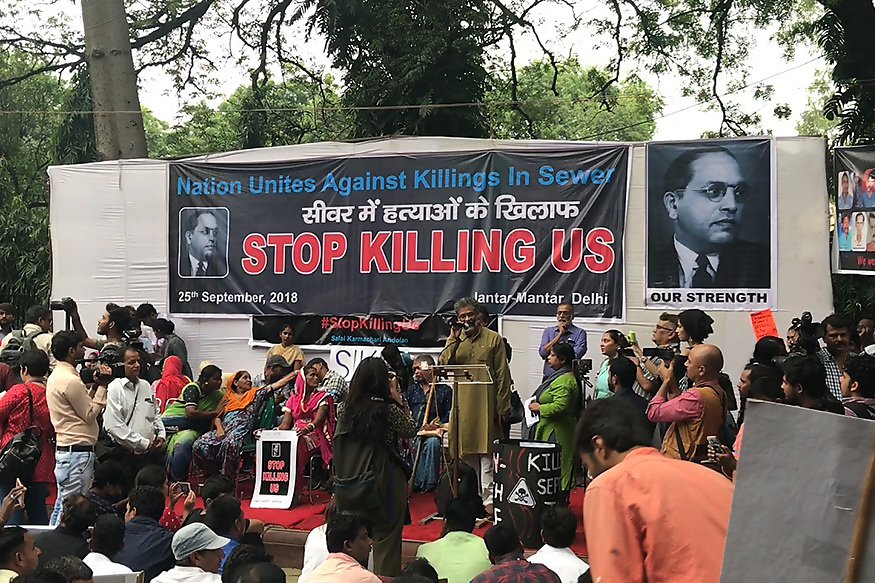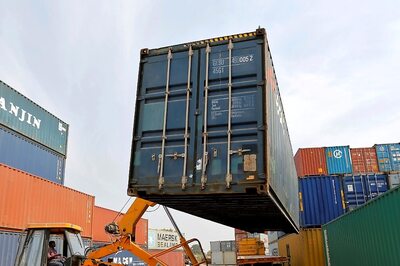
views
New Delhi: Following a spate of deaths of sanitation workers in the capital, Safai Karmchari Andolan (SKA) along with families of victims and prominent activists organised a protest at Jantar Mantar on Tuesday, calling an end to the age-old practice of manual scavenging and urging the government to compensate and rehabilitate sanitation workers.
Bezwada Wilson, founder and national convener of SKA, said the practice that predominantly employs Dalits, was rooted in the caste system. Wilson served an ultimatum to the government over demands of workers and said the protest would be first of many if the government did not take note.
“The government must declare a special package for sewage workers. There has to be a comprehensive survey of those who have lost their lives cleaning sewers and then a rehabilitation plan must be set up," Wilson said. “We will give the government a month to respond. If nothing happens still, we will occupy the Parliament Street," he added.
In his address of the gathering, Wilson said, “Sewer ki nahi, soch ki safai ki zarurat hai (Not the sewers, it is the mindset that needs cleaning)."
The oft-repeated message at the protest was that sewer deaths were not deaths, but murders.
According to SKA, 11 sanitation workers have died in the past seven days cleaning sewers in Delhi. Five workers, aged between 18 and 30 years, died on September 9 while cleaning a septic tank in upscale DLF Capital Greens residential complex in West Delhi.
Less than a week later, another worker lost his life while cleaning a Delhi Jal Board sewer pit in Dabri. In both the cases, none of the workers were provided with safety gear like gloves, oxygen masks and overalls. In Dabri, the worker, 37-year-old Anil, died because the rope that he used to enter the 20-feet deep sewer pit snapped.
Families of sanitation workers who died cleaning sewers sat on the stage alongside activists and SKA members addressing the gathering. Most of them were women, who had lost their husbands and sons to manual scavenging and were now struggling to feed their children.

Protesters with the 'Stop Killing Us' banner at the Jantar Mantar venue.
“My husband died in a sewer. I got some money as compensation and a job. But my husband is gone, he will not return. My son doesn’t have a father anymore," said Babli, who has come all the way from Ludhiana to take part in this protest. She said she earns a meagre Rs 6,000 a month, an amount too little to run a household. “Do I run my home or do I send my children to school?" she asked.
Babli was accompanied by Mamta and Saroj, also from Ludhiana. Their husbands too had died cleaning sewers. Both are now raising their children all by themselves, but when they look ahead, they only see a bleak future.
“Fathers, husbands will keep working in sewers. They will keep dying, and their sons and daughters will keep becoming fatherless," Mamta said. Saroj’s only son, a sanitation worker, was the sole breadwinnner of the family. When he died cleaning a sewer, he left behind a disabled father, two sisters and a mother to look after them all.
The other women on the stage had all lost husbands, fathers and sons in sewers. They said they had been ignored by the government and sent off with a token compensation and a wage that made survival a daily battle.
Hundreds of sanitation workers from different states gathered at the boulevard that led to Jantar Mantar. A banner shouted ‘Stop Killing Us’ and was flanked by two photographs of Dr BR Ambedkar.
Arjun and Monu came from Karauli in Rajasthan along with forty to fifty other workers. They had reached Delhi early morning and made their way to Jantar Mantar after a tea-and-biscuits breakfast. Arjun said they had cleaned human waste all their lives and never received any aid from authorities. “We want to quit this work and do something dignified," he said. But they rarely get a chance at dignity.
“Seventy one years of Independence and I still live the life of an untouchable," said 47-year-old Ashok Balmiki, also a sanitation worker from Karauli. He has cleaned sewers pits and septic tanks all his life. He said the society never gave him any other options. “If I open a tea stall, no one will drink the tea I make," he said. He does not want his son to live that life.
Thirty-five-year-old Jagdish Balmiki has done sanitation work since he was a child. Jagdish, who looks much older than his age, said sewers had turned young boys of his community old. “The chemicals corrode our skin and decay our insides. Our eyes are always red," he said.
Activists, leaders, writers came on stage one by one and said their bit in support of the workers. It was not just people, the sewers were also choking the Constitution, said ‘Swaraj Abhiyan’ founder Yogendra Yadav.
CPI(M) leader Brinda Karat said the spine of ‘Swachh Bharat’ was broken and called the Modi government “murderous".
Relatives of workers who died in Delhi in the past week also took the stage. Angad, brother of Vishal, one of the workers who died cleaning at DLF Capital Greens, said Vishal did not receive proper medical aid after he collapsed inside the septic tank. “My brother was alive, he was conscious when they pulled him out of the septic tank. But they did not provide him oxygen in the ambulance. He vomited when he was taken to the hospital, he was neglected. He couldn’t speak and he died without help. Later, doctors said there was 150 milliliters of sludge waste inside his stomach," Angad said.
As grief gave way to anger, families of victims demanded compensation and a life of dignity.
After the deaths at DLF society, Wilson had told News18 that he had written to all authorities, including the Delhi Jal Board, the Nagar Nigam and the Chief Minister’s Office, but failed to receive a single response. “Letters don’t work, we must agitate," he had said then.




















Comments
0 comment